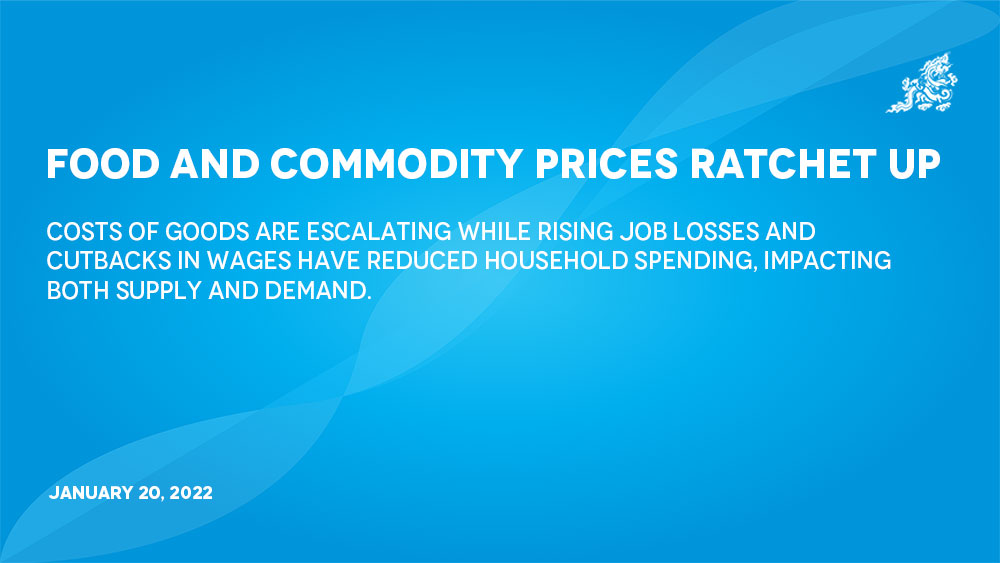Thukten Zangpo
Costs of goods are escalating while rising job losses and cutbacks in wages have reduced household spending, impacting both supply and demand.
A worker at a fuel station in Thimphu, Phub Tshering Lepcha, said that Nu 5,000 goes to food-related expenses. His monthly income is Nu 7,900.
The prices of goods and services had increased by 7.26 percent in November 2021 compared to November 2020, crossing the Royal Monetary Authority’s upper threshold inflation level of 6 percent.
Sugar and cooking oils recorded the highest increase of more than 20 percent, followed by meat, at more than 11 percent.
A litre of refined oil costs Nu 120. A kg of local chicken costs Nu 300, now compared to Nu 250 in 2020. Frozen chicken costs Nu 250 per kg and the price of fish is Nu 300 per kg.
There is an increase of Nu 100 for local beef. Currently, it is sold at Nu 400. A kg of pork has increased to Nu 450 from Nu 350. Sikam costs Nu 650. The price of a tray of egg costs Nu 550.
A meat vendor, Chenga Tshering, said that the cost of meat has increased from the supplier side in India and Bhutan.
Vegetables also recorded a high increase, by 7.32 percent. Local chilies are priced at Nu 750 per kg.
Chilies imported from India are priced at Nu 120 per kg. The cost of onions and tomatoes has risen to Nu 80 a kg. A kg of cauliflower is Nu 200.
A kg of local butter costs Nu 600. The price of a bag of 25kg of rice has increased to Nu 1,320.
Food inflation was mainly driven by exceptionally high vegetable and fruit prices in India. Because of the exchange rate pegged between Bhutan and India and the 80 percent share of Bhutan’s imports from India, long-term inflation rates between the two countries are highly correlated.
Transport recorded the highest increase among the divisions with 12.21 percent contributed by fuel (petrol and diesel) which increased by 52 percent on average. Increasing fuel and freight prices have pushed the price of essentials such as sugar and oil much higher.
A study by the Private Sector Development Committee under the Bhutan Chamber of Commerce and Industry found that about half of the increase in the cost of goods and services is due to an increase in fuel prices and driver switching modality at Sorchen.
In an earlier interview, an official from the National Statistical Bureau said that an increase in the prices of goods and services was primarily driven by the Covid-19 situation and the restrictions that lead to a shortage of supply of goods and services.
An importer said that the rise in the price of goods was due to price increases at factories, which could not operate at their full capacity.
“If the labour costs come down and we can import normally, the cost of the goods would come down by 2 percent to 3 percent,” he added.
Royal Thimphu College Professor of Economics Sanjeev Mehta said that the current inflationary trend is a global phenomenon and is caused by three major factors: disruptions in global supply chains, rise in fuel prices, and higher consumer spending in the economic recovery phase, since the pandemic led to a recession in 2020.
“It is termed as reopening inflation and is a concern,” Sanjeev Mehta said, adding that it is hurting fixed income groups, workers in informal sectors, small businesses, and the poor.
He also said that combined with higher unemployment, rising inflation will push more people below the poverty line, household debt will also rise, and spending cuts will follow.
“The government and central bank face a dilemma. With an aim to support recovery, monetary tightening and spending cuts may not be desirable. Administrative measures should be strengthened to avoid tendencies for artificial shortages, black marketing, and high markups,” Sanjeev Mehta said on what the government can do to curb inflation.
The government slashed the customs duty on third-country imports to a uniform 10 percent or zero from the tariff rate up to 50 percent from July last year to give Bhutanese a comparative cost advantage. However, prices have not gone down.


